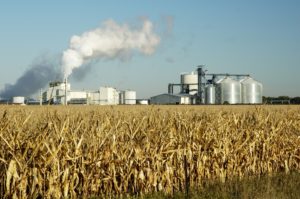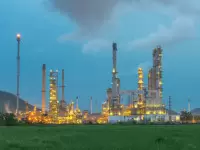
A Biofuel Production Operator is responsible for the quality of biofuel produced at his or her plant, and the smooth running of production.
What Does a Biofuel Production Operator Do?
We understand the great need for sustainably produced energy sources. The world has made a commitment to limiting the carbon emissions. Couple this with a dwindling supply of fossil fuels and erratic supplies, many countries are expanding biofuel production. Biofuel is not perfect, but it is a form of renewable energy and a solution to some periphery issues such as energy security. In the US, the growth has been immense over the last decade. Biofuel is grown on conventional farms either alongside or in place of food agriculture. Yet this raw biofuel material is not used raw; it must be processed at a relevant centre. Typically, this will be a factory. The factory will either remove the liquid material (such as oil) and discard the solids, or grind it down for refining into a useable product.
It is the role of a Biofuel Production Operator to ensure that the day-to-day production of biofuel runs smoothly. They are in charge of the area of IT responsible for the supply chain, heavy equipment, the production line and other systems. They may be responsible for taking quality control samples and correcting any errors in the system. They may carry out regular inspections and repairs, and submit quality control system to biochemists in labs where necessary.
Where Does a Biofuel Production Operator Work?
A Biofuel Production Operator is a type of Industrial Production Manager, managing processes and systems rather than people. Most people qualified in this this type of role work in metal production (11%) and transportation equipment manufacturing employ around 10%. Most relevant to the biofuel industry, some 8% are employed in chemical manufacturing plants. This is a small and growing area as the amount of biofuel production increases in the coming decades.
8% work at machinery manufacturing and 7% work in food processing and manufacture. A Biofuel Production Operator could conceivably work in any of these areas and at any factory requiring understanding of the concept of quality control. Although possessing skills in diagnostic and repair of heavy equipment and factory machinery, he or she will also have skills relevant directly to the biofuel processing and chemical engineering in general.
What Is the Average Biofuel Production Operator Salary?
According to the BLS, the median salary for biofuel production operators, who fall under the broader BLS category of industrial production managers, was $108,790 as of May 2020. Chemical manufacturers are the top payers in this profession, reporting a median salary of $120,330 during this time.*
Biofuel Jobs & Job Description
A biofuel production operator ensures the high quality of biofuel produced at his or her work site and ensures that day-to-day biofuel production runs smoothly. A biofuel production operator at the beginning of his or her career would likely be responsible for the following tasks:
- Collect biofuel samples and perform routine laboratory tests to ensure high quality
- Monitor meters, flow gauges or other real-time data to ensure proper operation of biofuels production equipment, record data and implement corrective measures as needed
- Adjust temperature, pressure, vacuum, level, flow rate or transfer of biofuels to maintain processes at required levels
- Operate energy production equipment or systems to extract biofuel products
- Develop strong knowledge of computer aided design CAD software, facilities management software and industrial control software
A more senior biofuel production operator would likely take on more of a management and supervisory role after gaining several years of experience. His or her daily tasks would likely include the above as well as:
- Supervise production employees in the manufacturing of biofuels, such as biodiesel or ethanol
- Manage operations at biofuel power generation facilities, including production, shipping, maintenance or quality assurance activities
- Provide direction to employees to ensure compliance with safety policies
- Review logs, datasheets or reports to ensure optimal production levels or identify problems with production
- Shut down and restart biofuels plant or equipment in emergency situations or for equipment maintenance
- Conduct employee training programs, including those on environmental awareness and workplace safety topics
- Monitor transportation and storage of flammable or other potentially dangerous products to ensure environmental and employee safety
What Is the Job Demand for Biofuel Production Operators?
The job demand for biofuel production managers is projected to increase by 5 percent between 2020 and 2030. Expansion of facilities in a growing industrial area could increase employment numbers, but the picture for biofuel is presently unclear.*
What Are the Education Requirements to Become a Biofuel Production Operator?
Degrees in this type of role are vital. In production management roles, employers prefer business administration degrees or something along the lines of mechanical or industrial engineering. However, due to the specialist area of this job type, it is vital to have studied degrees relating to environment and chemistry - chemical engineering would be advantageous, as would environmental chemistry as a science. Sustainability may be useful too. Environmental engineering could be advantageous in some cases. High school students should ensure that they have a great background in applied science, particularly in math, physics and chemistry.
Employees with many years of experience are sometimes able to work their way into these positions of responsibility. However, they may be required to take a training course to ensure that they have the relevant specialist knowledge and background to work in biofuel production and processing centers. They will certainly need to enter a form of relevant management and technical training.
Masters degrees are rarely required. Those who enter into postgraduate study in business management, industrial engineering, chemistry and so on are more likely to work in research or academia than on the shop floor, applying their scientific understanding to processing and manufacturing. There is a similar situation with doctoral studies. People with PhDs in chemical engineering are likely to find employment in research labs, developing the next generation of biofuels.
Biofuel Production - Related Degrees
What Kind Of Societies and Professional Organizations Do Biofuel Production Operators Have?
A growing area within heavy manufacturing, the global effort to reduce reliance on fossil fuels means the following groups presently exist.
- Biomass Power Association: Dedicated to promoting the use of biomass in the USA, they work with plants in 20 states at present, improving standards and working towards greater efficiency. They consult with government on legislation and policy and have an influential membership body
- Algae Biomass Organization: For those who work in algae production, this organization is there for you to promote and improve algae production for use as an alternative fuel source
- American Society for Quality: Although not specifically for biofuel, they are involved in quality control all over the world, no matter the industry, for factory work and production
*2020 US Bureau of Labor Statistics salary figures and job growth projections for industrial production managers reflect national data not school-specific information. Conditions in your area may vary. Data accessed September 2021.





